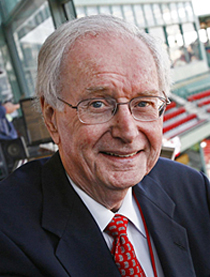
Culture
In Worcester ... there is a buzz of anticipation in the air as Polar Park, the new home of the Worcester Red Sox, prepares for its official debut on May 11. I am not a betting man, but I would wager the family jewels and anything else of value I could cobble together on this prediction: You're going to love Polar Park.

Flavin
It was half a century ago when the Louisville Colonels, the Triple A affiliate of the Boston Red Sox, were for all intents and purposes kicked out of Kentucky when the state decided to remodel the stadium in which the team had been playing into a football-only facility.
The Colonels, which had been well supported by a loyal fan base, were cast adrift, left to search for a new home. They found one in Rhode Island and that, in a nutshell, is how the Pawtucket Red Sox were born. After a few years of struggling, entrepreneur Ben Mondor took over ownership and built the team into one of the most successful franchises in minor league baseball.
Meanwhile back in Kentucky, the politicians soon learned the error of their ways. They discovered when people have baseball taken away from them, they are not happy about it; so millions of dollars in state funds were allocated to build a new baseball park in the hope of attracting another team to Louisville. The ploy worked, baseball came back to Louisville, and all it cost the state was a boatload of money it wouldn't have otherwise had to spend.
Fast forward five decades in Rhode Island; McCoy Stadium, the long-time home field of the PawSox had grown old, out of date, and -- everyone agreed -- it was not a realistic candidate for renovation. It was time for a new ballpark. Would Rhode Island learn from the mistake Kentucky had made 50 years before?
The answer would be a resounding "no." At least the then-speaker of the Rhode Island house of representatives hadn't learned from it. And that's the Ocean State's great loss.
After several false starts, Larry Lucchino, the PawSox chairman and managing partner, worked out an agreement between the team, the city of Pawtucket, and the Rhode Island governor's office over how funding for the project would be allocated. A site for the new ballpark right off Rte. 95 in Pawtucket was chosen. Janet Marie Smith, the famed ballpark architect, came on board. All the project needed for final approval was the backing of the legislature. The state senate signalled its approval.
Then the speaker used his influence to kill the deal in the house.
If he thought he was teaching Lucchino, who had been the Boston Red Sox president and CEO and had also run major league franchises in Baltimore and San Diego, a thing or two about hard-ball negotiating, he was sadly mistaken. Lucchino is a proud and accomplished man who had been treated with a mixture of suspicion and scorn for several years as he dealt with state house figures on the ballpark issue. Now, he had finally had enough. He began talking with Worcester, only 40 miles up the road from Pawtucket but light years away from the shortsighted politics of Rhode Island. The sad fact of the matter is that when the Rhode Island house voted down the financing arrangement for a new ballpark for the PawSox -- a deal to which all other parties had agreed -- it was also signing the death warrant for high level minor league baseball in the state.
Rhode Island is part of the territory assigned to the new Worcester Red Sox, so there is no chance that the politicians can do what the pols in Kentucky did 50 years ago, which is to build a new stadium in the hope of attracting another team. They killed baseball in Rhode Island when they killed that deal.
This has been a quiet spring in Pawtucket, a hard-scrabble, working-class city of 72,000; McCoy Stadium lies moribund and vacant, all talk of a new park ceased three summers ago. Pawtucket was collateral damage in the back and forth of state house politics, but it has been thrown a bone by preliminary approval of a USL soccer stadium for a yet-to-exist team. It's just a consolation prize (the USL is a second-tier professional soccer league), but for the city's sake let's hope it will work out because Pawtucket didn't deserve to lose the PawSox.
In Worcester, on the other hand, there is a buzz of anticipation in the air as Polar Park, the new home of the Worcester Red Sox, prepares for its official debut on May 11. I am not a betting man, but I would wager the family jewels and anything else of value I could cobble together on this prediction: You're going to love Polar Park. From its gleaming exterior to its wonderful sightlines, from the home bullpen that is built right into the stands adjacent to the first base dugout to the metal designs paying homage to Worcester that are carved into the sides of seats, it is more than a ballpark. It's a work of art. The standing room areas, for example, offer better views than those of any big league park in the country.You wouldn't expect less from a collaboration that includes the business acumen and the vision of Larry Lucchino; the eye for beauty and design of architect Janet Marie Smith; and the infectious enthusiasm and creativity of team president Charles Steinberg, all of whom worked together on the construction and design of Camden Yards in Baltimore, Petco Park in San Diego, JetBlue Park in Fort Myers, and, of course, on the refurbishing and rebirth of Boston's Fenway Park.
Attendance will be restricted to only 12 percent of Polar Park's capacity of 9,508 at the outset, but it is already a success; there is a waiting list of season ticket subscribers and the luxury boxes that ring the upper level are already sold out. The boomlet of economic development that the park's opening will set off is about to explode. Soon, the Kelly Square area will be the site of two new hotels, new housing, restaurants, and retail space. Worcester has a new baseball team and is on the upswing. Larry Lucchino is being hailed as a civic superhero.
And they owe it all to the Rhode Island state house.
- Dick Flavin is a New York Times bestselling author; the Boston Red Sox "Poet Laureate" and The Pilot's recently minted Sports' columnist.
Recent articles in the Culture & Events section
-
Boston and the nation respond to the San Francisco Earthquake of 1906Thomas Lester
-
See you in the storyLaura Kelly Fanucci
-
'Dignitas' and the mediaRussell Shaw
-
Scripture Reflection for April 14, 2024, Third Sunday of EasterDeacon Greg Kandra
-
St. Helena's House is established in the South EndThomas Lester


















